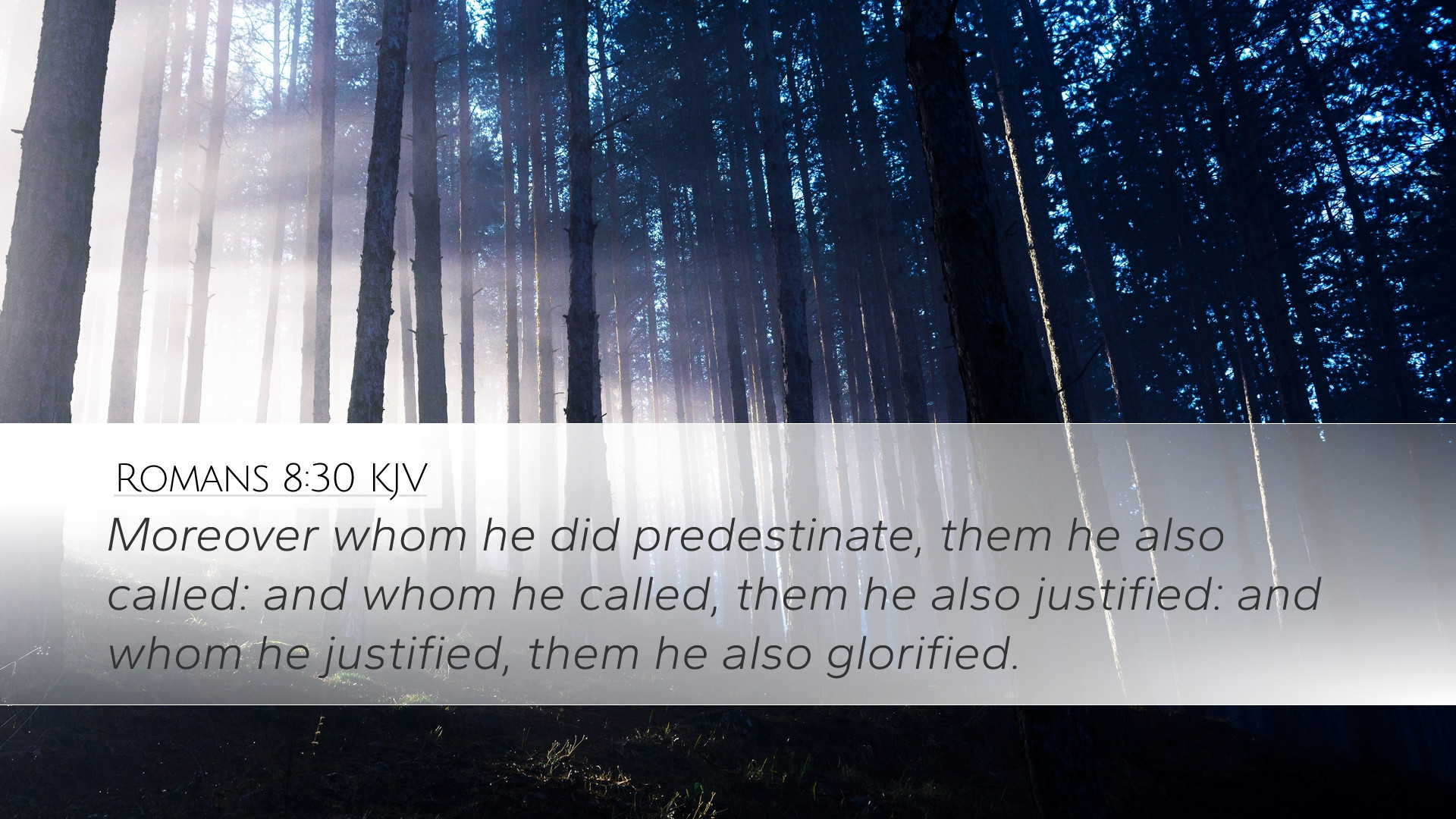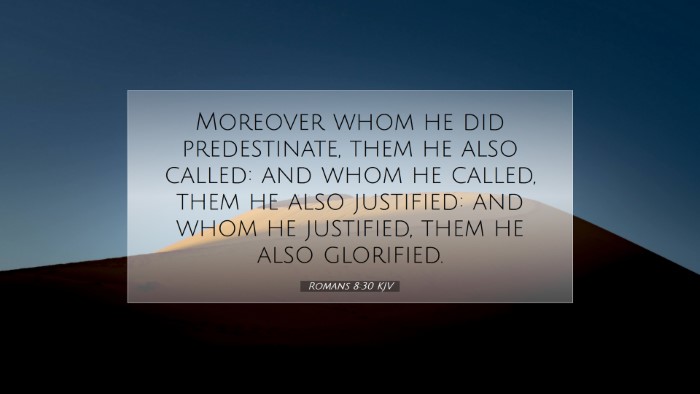Romans 8:30 - Commentary and Insights
Romans 8:30 states: "Moreover whom He predestined, these He also called; whom He called, these He also justified; and whom He justified, these He also glorified." This verse encapsulates the doctrine of salvation and the order of God's redemptive work. The insights from various public domain commentaries provide a profound understanding of its implications for believers. Below are detailed reflections based on the works of Matthew Henry, Albert Barnes, and Adam Clarke.
1. Context and Structure of Romans 8
The context of Romans 8 is critical for understanding verse 30. In this chapter, Paul discusses the life in the Spirit versus life in the flesh, emphasizing the power of the Spirit in the believer’s life. The passage flows logically into the grand theological truths encapsulated in verse 30, finalizing Paul's explanation of God's sovereign plan for redemption.
2. Predestination
Matthew Henry's Commentary elaborates on the meaning of 'predestination.' He emphasizes that this term does not indicate a capricious choice made by God, but rather a divine plan rooted in God’s foreknowledge. Henry states that before the foundation of the world, God set His love upon His elect, which shapes their entire experience of salvation:
- Divine Sovereignty: God is sovereign and His decisions are wise and purposeful.
- Foreknowledge and Choice: This implies a selective i.e. God’s choosing aligns with His omniscience.
3. The Calling
Albert Barnes focuses on the concept of 'calling.' He indicates that the calling referred to here is a spiritual one, which occurs through the gospel. This calling is not merely an invitation but an effective summons that leads to conversion. Barnes explains:
- Effectual Call: It is a call that cannot be resisted, in which God uses the gospel to draw individuals to Himself.
- Transformation: Those called are transformed, leading them to faith and repentance.
4. Justification
Adam Clarke describes justification as a legal term representing the act of being declared righteous before God. He emphasizes that justification is an essential aspect of salvation that highlights God's grace:
- By Faith: This justification is by faith alone, not by works, adhering closely to Paul's overarching theme in Romans.
- Real and Lasting: It changes the believer's status permanently in God’s eyes.
5. Glorification
The final state mentioned in Romans 8:30 is glorification. Matthew Henry points out that glorification is the ultimate culmination of the believer's journey. It is an experience where believers will be conformed to the image of Christ:
- Future Glory: Believers will share in Christ’s glory, a promise that brings hope amidst present suffering.
- Assurance: This assures believers that God will complete the work He has begun in them.
6. The Chain of Salvation
The structure of Romans 8:30 reveals a chain of salvation: predestination, calling, justification, and glorification. Each aspect is interconnected, illustrating the comprehensive nature of God’s work in salvation. Barnes notes:
- Certainty: If one is predestined, they will undoubtedly be called, justified, and finally glorified.
- Encouragement to Believers: This chain offers profound assurance to believers and serves as a reminder of God’s unchanging purpose.
7. Implications for Theology and Practice
This verse holds significant theological implications, including:
- Sovereign Grace: It underlines the efficacy of God's grace over human efforts in salvation.
- Security of Salvation: Believers can have confidence in their salvation, knowing that it is God who ensures their eventual glorification.
- Evangelistic Urgency: Understanding the calling aspect can motivate believers in their witness, as they play a role in God’s redemptive plan.
Conclusion
In summary, Romans 8:30 is a profound declaration of the stages of salvation that reveal the depth of God's love and plan for humanity. The insights from Matthew Henry, Albert Barnes, and Adam Clarke illuminate not only the individual components of this doctrine but also its significance in the life of the believer. This verse serves as a reminder of the unbreakable chain of God’s work in salvation, offering assurance, hope, and motivation to all who read and believe in its truths.


